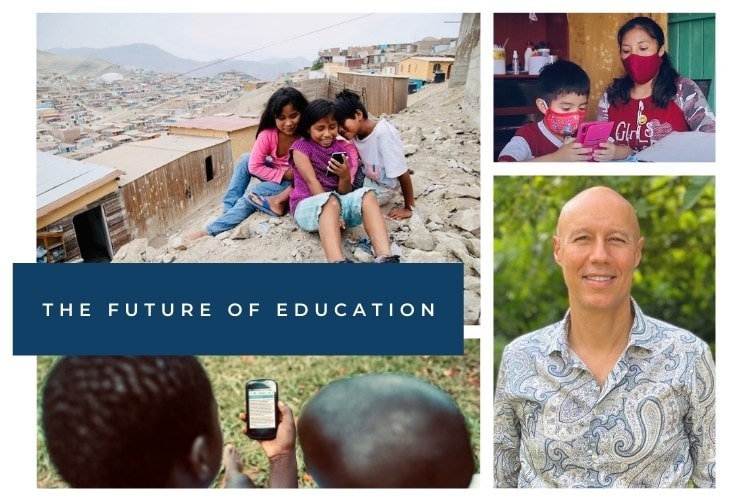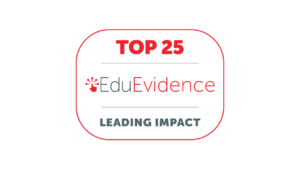Dear partners and supporters:
It goes without saying that 2020 was a challenging year. Here are my thoughts about where we’ve been and where we’re going.
Education matters more than ever.
Think about the problems we face worldwide. I’m not just talking about COVID. I’m talking about climate change and its knock-on effects, enduring inequality, and the next pandemic – the one that will require even more innovation and cooperation.
Who’s going to solve these problems – problems that require innovation, critical thinking, and empathy – exactly the kinds of skills that reading develops?
Children are really struggling. And so are schools.
You’ve read the statistics: 1.5 billion children out of school at the height of the pandemic, unprecedented social isolation for children and the mental health issues that come along with that, and extraordinary uncertainty both near- and longer-term.
This is a snapshot of global school closures taken on the 2nd of April 2020 when 1,484,715,875 learners were affected – that’s 84.8% of total enrolled learners. Source: https://en.unesco.org/covid19/educationresponse
Now overlay all that with the extra stress that comes from living in an underserved community. “Take classes on Zoom!” But that only works if you’ve got a dedicated computer and high-speed internet. “Find a quiet place to study.” But many children don’t have such a place in their homes. “Ask your parents for help and support.” But what if your parents don’t have time to support you?
So we have a problem, and an opportunity. We’ve got chronically underfunded school systems, children who’ve missed out on a year’s worth of learning, and parents frustrated by the status quo.
But we’ve also got a big, bright light shining on what we can do better – and a shared understanding that technology can play a fundamental role in supporting children’s educational success.
Here’s what a better education could look like.
Worldreader has learned a lot over our 11-year history about supporting vulnerable children and families through distance learning. COVID has given us all a taste of the challenges that remote learning presents – but it also lets us see the opportunities. Now is our chance to consider what education should look like in a post-pandemic world – an education that supports all children.
Here are a few principles we’d propose.
1. “Everywhere Learning.” Let’s recognize that children learn as much outside of school as inside the classroom.
The pandemic showed us that the world isn’t prepared for an education outside of a classroom – but it should be. Children should have access to high-quality content beyond the curriculum, content that is personalized to their own interests, content that they can learn from at their own pace.
Technology makes that possible. It’s why we make our library available to everyone, anywhere.
But technology and content alone aren’t enough to support the work of educators and the needs of children. So our books are accompanied by activities to further promote learning. And we make sure to engage parents as much as children because their role in supporting children’s growth is critical.
That’s how we were able to support over one million students since the start of the pandemic – even when their schools were closed.
2. Children need more than textbooks to navigate this crazy world.
The reason we’re passionate about reading is because we know it’s the foundation of all learning. Ask any successful leader today and I’ll bet they’ll point you to their love of reading as being a huge contributor to success. Bill Gates famously said, “I had a lot of dreams when I was a children. And I think a great deal of that grew out of the fact that I had the chance to read a lot.”
Our world needs more dreamers. While textbooks are essential, children need access to all sorts of books if they’re going to be future leaders – including books that help them think about social and racial justice, female empowerment, empathy, and environmental sustainability.
I’m proud to say our library brings these types of books to readers.
3. Children need to learn social and emotional skills – now more than ever.
Social and emotional skills – the ability to regulate our thoughts, emotions, and behaviors – determine how well we adjust to our environments. Considering how fast our world is changing, it’s no surprise that these are skills that children need.
The pandemic made this abundantly clear. It caused our children to face difficult emotions – fear, anger, grief. Without the tools to explore these emotions, children suffer enormously.
And by the way, there’s ample evidence that these “softer” skills are nearly as predictive of long-term occupational success as IQ – and even more predictive than parental income and socioeconomic status. (If you’re interested in this research, here’s a great OECD report on the topic: https://bit.ly/3uIYsx2)
Source: https://bit.ly/3uIYsx2
Our work helps children develop social and emotional skills in two ways: First, our library is full of children’s books on social and emotional learning. Second is our work with parents. As a parent, when you spend quality time reading with your child, you’re not only strengthening that bond, you’re also teaching them invaluable social skills. That’s why so much of our work is about encouraging parents to read with their children.
4. Education has to embrace the digital world.
Not just for cost, not just for distribution – it’s where children spend their time. Even the least-privileged children must be able move comfortably in a digital world, using phones, tablets, and computers with ease, assessing the quality of content, thinking of technology as an integrated part of their learning toolbox rather than an add-on.
The good news is that interest in digital education exists worldwide, even among low-income parents. A 2020 study by the Boston Consulting Group found that 80%-90% of the parents they surveyed in India wanted remote learning options to continue beyond COVID.
“A 2020 study by the Boston Consulting Group found that 80%-90% of the parents they surveyed in India wanted remote learning options to continue beyond COVID.”
You’re creating the future.
For the last 10 years we’ve been learning how to get as many people reading using the most simple and affordable technologies and highest-quality content possible. It’s what you’ve supported – and it’s the reason why over 17 million more people are reading today.
Because of you, our readers can read anytime, anywhere – even in places like Spiti Valley, India, a desert mountain valley located high in the Himalayas at 12,500 feet above sea level. The long, steep road makes it hard to bring physical books to the valley – so you can imagine the excitement when we were able to deliver 500+ digital books on tablets.
We know connectivity can be an issue, so thanks to your support, we work with some of the world’s biggest mobile providers to make sure readers can access our library for free.
We understand that books are knowledge, and knowledge is power. But not just any books. Over the years, your support has helped us create a digital library of more than 10,000 fantastic books for our readers – in English, Hindi, Spanish, Arabic, and many smaller languages.
We’ve learned just how important it is to involve parents right from the beginning, so we bake that into all of our reading programs.
And thanks to you, we were able to respond quickly when the pandemic happened. Together, we helped a million people. And, we brought our work to the US to support children that were hit the hardest.
This is what you’ve created, and this is our future. We’ll keep adding to our digital library. We’ll keep improving our technology (that includes adapting it to work on platforms like Reliance Jio’s newest inexpensive phones and Google’s ChromeBook). We’ll continue to work with parents everywhere to make sure they can support their children in the most impactful way.
In short, with your help, we’ll continue to innovate and contribute to the education system of the future – and help the children who will solve tomorrow’s problems.
Thank you for supporting readers as they build a better world.





